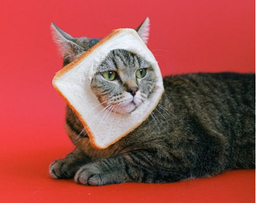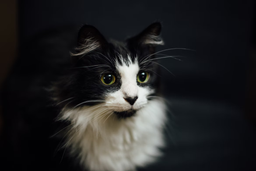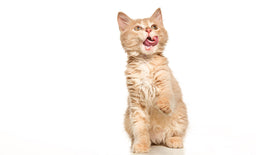What is the average cat weight? Is your cat within that range?
Cats of all shapes and sizes are adorable, but sometimes, a cat’s weight can be the most prominent sign of an underlying health problem. Learning about the average cat weight can help you spot any issues early on. But what is the average cat weight, and does it apply to cats of any age and breed?
In this article, you will learn:
- What the average weight for a cat is and whether it’s an appropriate guideline for all cats
- What impact can a quality diet have on your cat’s weight
- How to help your cat reach their ideal weight by learning what and how much they should eat
What is the average weight of a cat?
The average cat weight is considered to be between 3.6 and 4.5 kilograms. This estimate is mathematically spot on, considering that it’s the average that goes for all cats in general, regardless od the breed and the sex. Should you refer to it as a guideline, though? No, and you’re about to learn why.
Is the average cat weight a healthy cat weight?
This estimate isn’t the best guideline for determining a healthy weight of a cat because it isn't breed-specific. For instance:
- Some breeds, like the Maine Coon, are much larger than the average cat but not necessarily overweight
- Any member of a breed like the Ragdoll would be considered overweight according to the average cat weight data
- Many breeds, like the Sphynx, can weigh as little as 2.7 kilos and be considered within the healthy weight range
- Some small breeds, like the tiny Singapura, can weigh as little as 1.8 kilos and still be just right
If we can’t compare all cats to one average cat weight estimate, what can we do? We can:
- Zoom in on particular breeds
- Calculate a separate average for each sex because, in most cases, a male cat is around one to two kilos heavier than a female cat
- Not take the estimates too seriously
What is the average cat weight for adult cats by sex?
The sex of your cat plays the biggest role in determining their healthy weight. To understand the difference in what’s considered a normal weight for felines of opposite sexes, refer to the following cat weight charts.
Average cat weight for male cats
Check out the table to learn about the average weight of adult male cats of the most popular breeds in the UK:
|
Breed |
British Shorthair |
Bengal |
Siamese |
Maine Coon |
Persian |
Ragdoll |
|
Weight (in kilos) |
4–8 |
4–7 |
5–7 |
5–9 |
4–6 |
6–9 |
Average cat weight for female cats
Consult the table below to learn about the average weight of female cats of the above-mentioned breeds:
|
Breed |
British Shorthair |
Bengal |
Siamese |
Maine Coon |
Persian |
Ragdoll |
|
Weight (in kilos) |
3–5.5 |
3.5–4.5 |
3.5–5.5 |
3.5–5.5 |
2.5–4 |
3.5–7 |
What is the purrfect weight for a kitten?
If your cat had babies recently, or you decided to foster kittens, use the table below as a reference for your kittens’ weight progression:
|
Week |
Weight (in grams) |
|
First week |
50–150 |
|
Second week |
150–250 |
|
Third week |
250–350 |
|
Fourth week |
350–450 |
|
Fifth week |
450–550 |
|
Sixth, seventh, and eighth week |
550–850 |
The table shows weekly values, but if you want to be more meticulous, you can weigh your kittens every day. Vets say it’s good practice, and it can help you discover any health-related issues early on. On average, a kitten should gain at least 10 grams a day.
Is your cat of a healthy weight?
If your furry friend weighs more or less than the standard for their particular breed, you might be concerned about their weight. In case you don’t have a scale at hand, you can check them for signs of excess weight. To examine your cat, do the following:
- Put your furry friend in your lap to get them nice and comfy
- Take a good look at your kitty’s figure
- Pet your kitty and apply pressure (be firm but don’t press too hard)
- Try to feel your cat’s ribs, belly, and spine
After examining your cat, refer to the table below to check the category your cat belongs in:
|
Body part |
Underweight |
Healthy |
Overweight |
Obese |
|
Ribs |
They will feel like your knuckles and be prominent |
They will feel like the back of your palm |
You can barely feel them |
You cannot feel them |
|
Stomach |
Significantly tucked up |
Tucked up |
Slightly rounded |
Significantly rounded |
|
Waist |
Extremely visible and feeling boney |
Slightly visible |
Less visible |
Not visible |
|
Spine |
Extremely visible and feeling boney |
Not visible but palpable |
Not visible and slightly difficult to feel |
You cannot feel it because of a thick layer of fat |
My kitty isn’t within the ideal cat weight range. Should I be worried?
If your kitty isn’t within the ideal cat weight range, it can (but doesn’t have to be) a bad sign. Sometimes, you can find exceptionally large or small kittens in a litter, and the reasons why they are of abnormal weight can be:
- Gigantism, acromegaly, or dwarfism—These are genetic or hormonal conditions that affect your kitten’s growth
- Superfecundation—This is a rare event when a female cat is bred by and carries kittens of different males
- Genetics doing its magic—Sometimes, kittens are naturally larger or smaller than the rest of the litter without a particular cause
- The kitten in question getting more or less food than the rest of the litter—Some kittens are quicker to get to their mother. Kittens who eat more become stronger quickly and are more successful at fighting off their siblings during mealtime
Signs that your furry friend needs help
Was your cat of a healthy weight but started to act strange recently? Some signs you can notice if your kitty needs medical attention include:
- Lethargy
- Significant decrease or increase in interest in food
- Begging for food by:
- Vocalising intensely
- Guiding you to the feeding area
- Waking you up
- Walking by your legs and cuddling up to them
- Sudden weight loss or gain

It wasn’t enough that they called me fat today, now you have to annoy me with your smooches!
Source: Meruyert Gonullu
Medical conditions that can cause deviations in your cat’s weight
If your cat’s weight is fluctuating rapidly and you suspect that an illness is the culprit, you might be right. Depending on your furry friend’s age, some of the most common medical problems that cause weight deviations include:
|
Age |
Medical conditions |
|
Kitten |
|
|
Adult cat |
|
Reasons why your kitty is overweight
Is your kitty eating excessively? If you notice your furry friend is rounding up, it might be because of:
- Parasites—These pesky creatures absorb your cat’s nutrients and cause them to eat up to compensate
- Nutrient malabsorption—When your kitty’s body consistently fails to absorb nutrients from food, it sends signals that it needs more of these essential components, causing your cat to feel more hungry and eat up
- Diabetes—This illness causes your cat’s body to be unable to absorb glucose and break down fats and proteins to provide energy. As a result, your cat might have increased appetite
- Hyperthyroidism—An overactive thyroid is proven to increase thirst and appetite
- Cancer—Cat’s that have cancer often experience muscle loss, which causes their body to crave more glucose and energy
Causes behind feline weight loss
When a cat loses weight, it’s usually because of:
- Psychological stress—If your cat doesn’t have their own feeding area and can’t eat without disturbances (like noise or other animals), they might avoid eating until they see that the area is safe
- Food allergies—Persistent food allergy symptoms can cause your kitty to lose interest in food
- Lack of food—Is your kitty more active lately? If you notice your cat losing weight, try increasing their daily intake by a half of, or an entire meal
- Toothache—Our furry friends have small mouths and can’t chew on the other side as we do, so they avoid eating at all when toothache is at play
- Underlying medical conditions—Regardless of how much your kitty eats, pesky illnesses can grab hold of those nutrients and deprive your furry friend of the ones they need most, causing weight loss. Fortunately, with a vet’s help and swift action, most of the conditions are completely treatable

WHERE’S MY LUUUUNCH?
Source: Serena Koi
Ways a vet can help you estimate, reach, and maintain your furry friend’s healthy weight
When you visit the vet’s office, your furry friend will undergo a series of analyses that will help the vet find out what’s going on—such as:
- Blood test
- Urology
- Ultrasound
- Radiography
The vet will consider your cat’s sex, size, and breed to estimate what their healthy weight should be. If the test results are suspicious and your cat is over- or underweight, the vet will perform some further testing to narrow down on the cause.
Once the vet diagnoses your cat, they will prescribe the appropriate treatment and suggest (or insist on) a diet that will help regulate your cat’s weight. You should abide by those instructions to ensure a rapid recovery for your cat. If you have any concerns, suggestions, or foods you want to introduce, it’s best that you consult your vet first.
During the course of the therapy, you will have regular vet checkups to ensure that:
- The diet and medication are working
- Your kitty is making progress
- Your cat isn’t showing any signs of allergies to the medication or foods in their diet

What do you mean “we’re going on a diet”?!
Source: Tranmautritam
Reasons to help your kitty reach healthy cat weight
A few extra grams on your cat don’t seem like much to you because it doesn’t make a significant difference for humans. Did you know that about half a kilo extra weight on your feline companion translates to 7 kilos on an adult woman or 8 kilos on an adult man? Our furry friend’s sturdy yet fragile bodies aren’t designed to work with extra weight. Even though your chubby kitty might still run around and play, the extra weight will put pressure on their organs and bones and potentially cause health problems, such as:
- Arthritis
- Increased chances of cancer development
- Diabetes
- Liver disease
- Urinary problems
- Pancreatitis
- Lameness
- Skin problems (dandruff and itchiness)
Despite them being adorable, cats that are on the rounder side will see the consequences over time, so it’s best to help them reach a healthy weight as soon as possible. Note that you shouldn’t rush progress and weight loss as you can cause tremendous shock, which can make your cat avoid food entirely.
How to keep your furry friend catwalk-ready—top tips and tricks
Once your kitty reaches a healthy weight, these tips and tricks will aid you in maintaining their fabulous figure:
- Keep track of meals—Get a chalkboard or whiteboard and write down all the meals you serve to your furry friend
- Serve treats in moderation—Feline specialists say that treats should be under 10% of your kitty’s daily caloric intake
- Switch to a high-quality diet—Many cat parents feel like they can’t afford to put their kitty on a high-quality diet. There is a distinct difference between a high-quality diet and food that’s labelled as premium, though. The former will impact your furry friend’s life for the better, while the manufacturers of the latter might be using the word "premium" to trick you into buying. A real high-quality diet containing over 50% of whole meat proteins is the best way to ensure a healthy and happy life for your kitty

Mom, if the diet was such a great idea, it wouldn’t have the word “die” in it, would it?
Source: Freepik
How does a high-quality diet help with healthy cat weight?
Cat food needs to provide the nutrients cats need to:
- Fuel their bodily functions
- Create other nutrients that aid the chemical processes in their body
Most commercial food options don’t provide those essential nutrients despite claiming they do. Fortunately, there are high-quality brands on the market that:
- Are transparent with their ingredients
- Provide all of the key nutrients without unnecessary fillers (such as grain or vegetable and meat derivatives)
- Don’t make any sketchy claims about their products
By choosing high-quality cat food, you’re ensuring the best quality of life for your feline.
High-quality diet essentials
The essential nutrients that every high-quality cat diet is based on include:
- Animal-based protein—Being obligate carnivores, cats depend on a whole meat-based diet to be healthy. Meat proteins contain the necessary profile of amino acids that cats need for crucial organ functions. The nutrient also significantly contributes to a cat’s daily caloric requirement
- Vitamins and minerals—From the sturdiness of the bones to the shine of the coat, vitamins and minerals play a significant role in keeping our furry friends healthy. Most essential vitamins and minerals come from meat, too
- Fat—Fat supports several life processes like maintaining a cat’s thermal balance and helping with nutrient absorption. It also provides energy, although protein should be the primary source of energy for cats. Many manufacturers overload their meals with fats to increase palatability, but a high-fat diet could lead to obesity and heart disease
- Moisture—Cats don’t drink a lot of water—they get most of their daily water intake from food. If your furry friend’s food lacks water, they won’t feel the need to drink more to compensate. That’s why we need to make sure their food has enough moisture—you’ll find it in most wet food (gravy and jelly formulas). If you decide to include dry food in your kitty’s diet, you'll need to get your cat to drink enough water on the side
Untamed—because your furry friend’s health matters to us
Untamed came to life when our team member’s cat, Sian, became severely ill. In accordance with our vet’s advice, and with a dash of imagination and a whole lot of love, our team created the recipes as you know them today. Our furry friend got back on his feet soon enough, thanks to a diet comprised of human-grade whole meats and fish.
We wanted other cat parents to experience what a quality diet can do for their cats, which allowed us to outgrow our kitchen, but still keep that homemade quality and feel in our meals. Do you want to witness the power of a high-protein diet, too? Join us in our journey—try Untamed!
The benefits of making Untamed a part of your cat’s diet
An apple a day keeps the doctor away for humans, and high-quality cat food does the same for your cat. Some of the numerous benefits of switching your cat to a quality diet can be visible in a matter of days and include:
- Improved digestion
- Softer and shinier coat
- Increase in energy levels
- Normalisation of appetite
- Reduced allergic reactions thanks to hypoallergenic meals
Untamed strives to create tailor-made meals that provide these benefits to your furry friend, and many of our pack members already witnessed what a prime quality diet can do for their beloved cats! Do you want to join them? Learn how to get started!

This is my new diet? Sweet!
Image (c) Untamed
Join the pack and get your starter kit in no time!
You’re only a couple of minutes away from making a decision your kitty will thank you for! All you need to do is place a cat food order online—here's how:
- Navigate to our Try Now page
- Tell us about your furry friend and their food preferences
- Order your taster pack
Your order will reach you within a day, so your cat will be delighted to munch on our meals
If our food hits the right note with your cat, we’ll be happy to deliver Untamed supplies to your doorstep every month with no extra shipping cost. Our terms are pretty flexible—you can always:
- Pause your cat food subscription
- Shuffle the contents of the order to try out a new product
- Postpone or cancel your order at any moment!
We strive to keep our operations environmentally sustainable, so the packaging we use is always recyclable. Our products are available in sturdy aluminium tins and have a shelf life of three years.

![Best food for Ragdoll cats in the UK [Broken Down]](http://untamed.com/cdn/shop/articles/featured_best_food_for_ragdoll_cats_uk.jpg?v=1646818249&width=256)

